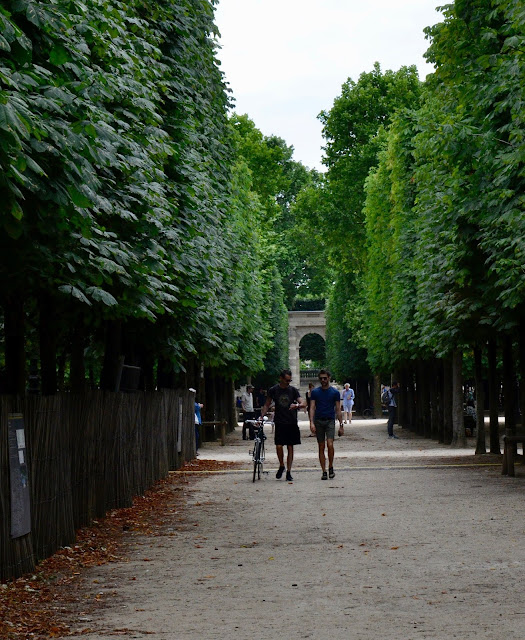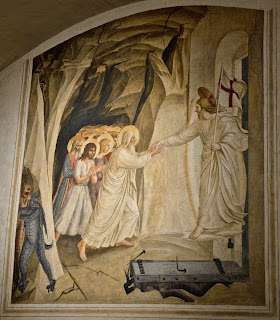Standing in the road
It is often in retrospect that things become clear, isn’t it? We look back, from a little distance perhaps, and see a bigger picture. See connections we weren’t able to see while we were in the midst of things. This is not just a human phenomenon, hindsight being 20-20 and all, but it is also a common theological theme. The entire Gospel of Mark is seen through this lens, that only after his Resurrection could people know who Jesus really was, which helps explain why the disciples seemed especially thick-headed in that Gospel. One had to see the whole and then look back onto the parts to make sense of them.
The looking back itself is an exercise in remembering, connecting, re-experiencing. Sometimes it takes us our whole lives to finally see something clearly, especially if that something carries with it great emotional weight.
All of the Gospels want us to understand that the story of Jesus is one of remembering a whole, although all the parts are vital, because it is through his resurrection and ascension that Jesus completes his work and we finally understand what he was about. The disciples thought he would put a mighty gate between Israel and the Romans but actually Jesus came to break down the gates of Hell and open the gate to heaven.
So today in our well-beloved story of Jesus meeting Cleopas and his friend debating what on earth just happened as they walked the few miles from Jerusalem to Emmaus on Easter afternoon, we see how this retrospect thing works. Their hearts are sad and their eyes are unseeing as they try to make sense of the last three day’s activities. Jesus comes along and explains the events of those days in terms of the Scriptures. He shows them the connections between Moses and himself, between God’s people back then and God’s people now. He shows them how God acted in history - much the way we remember in the Easter Vigil the stories of God coming to and saving God’s people and use that as a lens through which to see the events of Easter morning. Look! God saved then. And God saves now. Look! Moses led his people to safety, pointed them toward the Promised Land. And now Jesus has done the same.
The two men are thrilled to recognize Jesus as he took bread and blessed it and broke it and gave it to them. Their hearts had been burning as he interpreted the Scripture to them and their eyes are opened to recognize the Lord at their table. Be known to us, Lord Jesus, in the breaking of the bread.
So the story begins in sadness and confusion and ends in joy. Jesus is truly risen and it’s not just an unsubstantiated rumor. Jesus has appeared to his friends and made himself known. They can look back and see that the things that happened were meant to bring about good. They can remember the things Jesus told them that had been hard and confusing and now they can understand.
We always read this story on the Third Sunday in Easter in Year A. And this is the only time (on Sundays) we read it. It continues the events of Easter Day and brings that day to a happy close. It is a beloved story of joy coming in the morning after a night of weeping, of God bringing life out of death, of the connection between God and people in this specific way of reading Scripture and breaking and blessing and giving and taking bread together. It is a reminder, just as last week the story of Thomas was a reminder, that we didn’t have to be with Jesus to know him and have faith in the salvation story. Blessed are those who have not seen and yet believe. You will know him in the breaking of the bread.
 But this year, I read this story and weep. We are not breaking bread together. I do take solace in our collect for the day that reminds us that we know God in all God’s redeeming works, and the story reminds us that Jesus is also known in the Scriptures and comes to us in faith and walks with us on our own roads. I know all that and I believe all that. But the experience of knowing him in the Eucharist is not available right now. And I miss that so much. Gathering people at the table to give them bread and wine is the part of being a priest that I love best. I am grieving the loss of it even while I know that this is temporary.
But this year, I read this story and weep. We are not breaking bread together. I do take solace in our collect for the day that reminds us that we know God in all God’s redeeming works, and the story reminds us that Jesus is also known in the Scriptures and comes to us in faith and walks with us on our own roads. I know all that and I believe all that. But the experience of knowing him in the Eucharist is not available right now. And I miss that so much. Gathering people at the table to give them bread and wine is the part of being a priest that I love best. I am grieving the loss of it even while I know that this is temporary.
And I weep because of all the details of this rich and beautiful story, the one that stands out to me the most today is when the two disciples stand still in the road, looking sad, and say, “We had hoped.” This is something I know, I’ve experienced, just standing still in the middle of the road and looking back in regret. I am standing there now.
We don’t know how long our exile is going to last, and we don’t know what much of anything is going to look like when it’s over, especially church. We’re not going to “go back to normal” but instead will come to know and understand a new normal. And that new normal might not be what we had hoped and we may look back in regret. So while I firmly believe that God is going to bring good things out of this disaster, that doesn’t mean that we are not going to feel the losses we will have sustained.
Disappointment and regret, dashed hopes, trying to make sense of disaster - these are part of the human experience. Resurrection doesn’t mean that we won’t feel them any more. Good Friday and Holy Saturday are still part of the story. Maybe this year, some of us are just going to stay standing in the road for a little longer. Maybe this year, at least for some of us, it’s too soon to do anything else.
The good news is that at the right time, whenever that is, Jesus will meet us on that road and walk with us into the light. I’m ok with lingering with the weeping right now, because I know that God has promised to wipe away every tear. I know that some day we will look back and see a bigger picture that puts our tears and our fears and our regrets into their proper perspective.
So I’m going to save this story to read again when the time is right. Or maybe, like the movie Groundhog Day, I’ll just keep reading it every day until the time is right for my eyes to be opened with new understanding and I will see what Jesus wants me to see about this time of fear and sorrow. This, too, is salvation.




Comments
May you and yours stay safe to the end of this particular trial
Blessings.